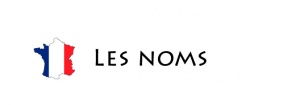Language/French/Grammar/Nouns
A noun is a word representing a person, a place or a thing. In French, all nouns have a gender masculine or feminine.
In this lesson, we will explain how to form the masculine, feminine and plural of nouns.
|
Masculine |
Feminine |
|---|---|
|
un ami (a friend) |
une amie (a friend) |
|
un acteur (an actor) |
une actrice (an actress) |
|
un musicien (a musician) |
une musicienne (a musician) |
|
un boulanger (a baker) |
une boulangère (a baker) |
|
le détective (the detective) |
la détective (the detective) |
|
le professeur (the professor) |
la professeur (the professor) |
In French the masculine and feminine nouns differ. different articles and adjectives are also used.
Countries ending in "-e" are feminine (except "le Mexique") : - le Portugal, le Brésil... - la France, l'Espagne, l'Argentine...
The feminine is generally formed by adding -e to the male, and in some cases other letters or accents are added.
Sometimes, there are different nouns for male and female forms. Some professions are used only in men :
Examples
|
Singular |
Plural |
|---|---|
|
le château (castle) |
les châteaux (castles) |
|
le cheval (horse) |
les chevaux (horses) |
|
le bus (the bus) |
les bus (buses) |
|
le nez (nose) |
les nez (noses) |
|
les gens (people) |
Noun singular and plural
un livre (a book) des livres (books)
The plural is generally formed by adding -s to the singular.
Some nouns have special plural, according to the termination: -eau becomes -eaux -al becomes -aux -s remains the same -s -z remains the same -z
Some nouns have no singular form
Examples
|
Singular |
Plural |
|---|---|
|
le château (castle) |
les châteaux (castles) |
|
le cheval (horse) |
les chevaux (horses) |
|
le bus (the bus) |
les bus (buses) |
|
le nez (nose) |
les nez (noses) |
|
les gens (people) |
Adjectives and nouns:Table of the masculine and feminine endings:
| Adjectives | Masculine + E = Feminine | Il est étudiant
(He is a student) |
Elle est étudiante
(She is a student) |
|
|---|---|---|---|---|
| Il est grand
(He is tall) |
Elle est grande
(She is tall) |
|||
| Le ciel est bleu
(The sky is blue) |
La mer est bleue
(The sea is blue) |
| Adjectives | -EN becomes -ENNE | Il est italien
(He is italian) |
Elle est italienne
(She is italian) |
|---|---|---|---|
| Il est parisien
(He is parisian) |
Elle est parisienne
(She is parisian) | ||
| Il est canadien
(He is canadian) |
Elle est canadienne
(She is canadian) | ||
| Il est européen
(He is european) |
Elle est européenne
(She is european) |
| Adjectives | -ON becomes -ONNE | Il est bon en sport
(He is good at sport) |
Elle est bonne en sport
(He is good at sport) |
|---|---|---|---|
| Adjectives | -ER- ÈRE | Il est boulanger
(He is a baker) |
Elle est boulangère
(She is a baker) |
|---|---|---|---|
| Il est boucher
(He is a butcher) |
Elle est bouchère
(She is a butcher) | ||
| Il est policier
(He is a policeman) |
Elle est policière
(She is a police officer) |
| Adjectives | -EUR and -EUX become -EUSE | Il est heureux
(He is happy) |
Elle est heureuse
(She is happy) |
|---|---|---|---|
| Il est furieux
(He is furious) |
Elle est furieuse
(She is furious) | ||
| Il est danseur
(He is a dancer) |
Elle est danseuse
(She is a dancer) |
| Adjectives | -TEUR becomes -TRICE | Il est acteur
(He is an actor) |
Elle est actrice
(She is an actress) |
|---|---|---|---|
| Il est instituteur
(He is primary school teacher) |
Elle est institutrice
(She is primary school teacher) | ||
| Il est traducteur
(He is a translator) |
Elle est traductrice
(She is a translator) | ||
| Irregular Adjectives | Beau (Beautiful) | Belle |
|---|---|---|
| Vieux (Old) | Vieille | |
| Blanc (White) | Blanche | |
| Gentil (Kind/Nice) | Gentille |
| Adjectives and nouns which never change | Adjectives | Nouns |
|---|---|---|
| Jeune (Young); Calme (Quiet); Drôle (Funny); Stupide (Stupid); Bizarre/Étrange (Strange); Sage (Wise); Triste (Sad) | Un(e) journaliste (A journalist); Un(e) peintre (A painter); Un(e) ministre (A minister); Un(e) maire (A mayor); Un(e) pompier (A fireman); Un(e) juge (A judge); Un(e) sage-femme (A midwife); Un(e) militaire (A serviceman/servicewoman); Un(e) gendarme (A gendarme = police officer [other branch of the french police and army]); Un(e) médecin (General practitioner GP); Un(e) dentiste (A dentist); Un(e) psychologue (A psychologist); Un(e) gynécologue (A gynaecologist); Un(e) scientifique (A scientist); Un(e) astronaute (An astronaut); Un(e) archéologue (An archaeologist) ................ |

